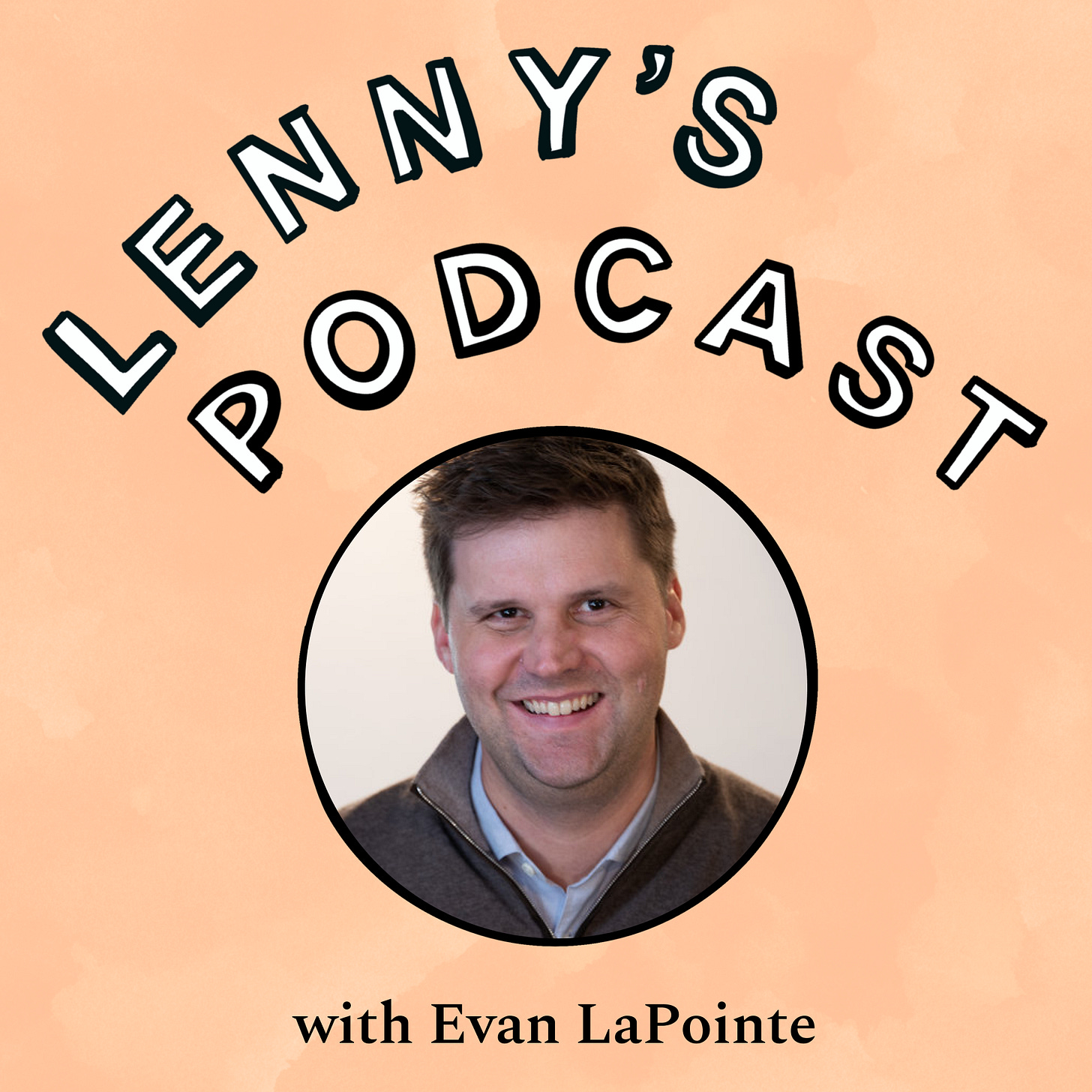Brought to you by:
• Webflow—The web experience platform
• Explo—Embed customer-facing analytics in your product
• Eppo—Run reliable, impactful experiments
—
Evan LaPointe is the founder of CORE Sciences, which teaches companies and individuals how our brains work and how that translates to improved collaboration, better products, faster decision-making, and more growth. Previously, Evan was the co-founder of Satellite, the fourth-largest analytics product on the internet today (it mostly runs behind the scenes, and pretty much everyone listening will have used it today without knowing it), which was acquired by Adobe, where he later ran product strategy, innovation, and long-range thinking for Adobe’s digital experiences business. In our conversation, we discuss:
The three different systems of the brain
How knowing this can help you become more influential
How understanding different brain states will help you increase productivity and creativity
How to improve your vision and strategy skills
How to design a work environment that fosters innovation
How to build better relationships at work
Much more
—
Use discount code “LENNY” for $5 off the CORE Sciences personality profile: https://www.core-sciences.com/new-core-identity
—
Listen now on Apple, Spotify, and YouTube.
Some takeaways:
To run more effective meetings:
Start each meeting with a brief priming session: Spend a few minutes at the beginning clarifying the meeting’s goals, the mindset needed, and any relevant background information. This ensures that everyone is on the same page and ready to engage.
Structure meetings with diamond thinking: Begin with broad, exploratory discussion (expansion) and then narrow down to specific decisions (convergence). This helps in generating diverse ideas before focusing on decision-making.
Utilize templates: Create templates for different types of meetings (e.g. brainstorming, tactical discussions, decision-making) to standardize preparation and execution. Ensure that these templates include sections for agenda, objectives, and expected outcomes.
After meetings, evaluate their effectiveness: Ask for feedback on whether the priming was sufficient and if the decision-making process was clear. Use this feedback to refine future meetings.
To improve vision and strategy:
Acknowledge your personality type: If you are low in openness, recognize that big, abstract ideas may be challenging for you. This self-awareness can help you anticipate and manage these challenges effectively.
Create a supportive “habitat”: Cultivate a work environment that supports different cognitive styles and encourages experimentation. This can prevent issues like excessive focus on ROI or rigid adherence to procedures, allowing for more effective and innovative problem-solving.
Leverage team diversity: Create a team environment that values different ways of thinking. For instance, if you struggle with big-vision thinking, partner with team members who excel in that area. Encourage collaboration where each person’s strengths can compensate for others’ weaknesses.
Reverse engineer your desired outcome: Identify what you want to achieve (e.g. a successful product launch) and then break down the inputs and processes that lead to that outcome. For example, if you aim to innovate, research past successful innovations to understand key factors such as market needs, user feedback, and team dynamics.
The brain has three main systems: safety, reward, and purpose. Understanding how these systems work can help you optimize your own performance and better motivate your team.
Safety system: If you’re feeling threatened or anxious, your brain is focused on returning to safety. This can narrow your focus and limit your productivity.
Reward system: If you are motivated by incentives or recognition, align tasks with clear rewards to boost engagement and efficiency.
Purpose system: Find meaning in your tasks by understanding their impact on others, even in small ways.
When faced with a problem or decision, identify which “department” of your brain you’re using. Actively choose which department to consult based on the problem at hand. For new challenges, engage the science or art departments instead of defaulting to historical solutions.
Science department: For open-minded experimentation and innovative solutions
Art department: For creative and boundary-pushing ideas
History department: For relying on past experiences and familiar methods
To build better relationships:
Focus on being a positive experience for others. Be friendly, supportive, and approachable, as these traits make you more enjoyable to work with, regardless of your skill level.
Assess and build trust at three levels: basic reliability, competence in critical tasks, and expertise beyond your own capabilities. Ensure that team members understand and respect these levels of trust.
Encourage open, honest discussions about differing beliefs and opinions.
To enhance focus, implement a structured approach to balancing your time across different brain wave states—alpha, beta, and gamma.
Alpha state (daydreaming and creativity): Allocate 10 to 20 minutes daily or several times a week for activities that foster daydreaming and creativity, such as walking, showering, or casual brainstorming sessions in a relaxed setting. This helps unlock creative ideas and innovative solutions.
Beta state (productivity): Designate specific times for focused, high-output tasks like responding to emails, attending meetings, and completing regular work. Use tools like time blocking or the Pomodoro Technique to manage this period effectively.
Gamma state (deep focus and problem-solving): Set aside dedicated periods (e.g. one to three hours) for deep, intensive work that requires high cognitive effort and problem-solving. Ensure that these blocks are free from interruptions and distractions to maximize effectiveness.
Stop assuming people are similar to you. Instead, build the muscle for getting along with people very different from you. Start by building self-awareness through uncovering your Big Five test results, the most scientifically robust personality test (link in show notes). If teams complete the Big Five test and share their results with one another, they can better appreciate individual strengths and weaknesses, which helps reduce friction and improve efficiency.
Where to find Evan LaPointe:
• X: https://x.com/evanlapointe
• LinkedIn: https://www.linkedin.com/in/evanlapointe/
• Website: https://www.core-sciences.com/
In this episode, we cover:
(00:00) Evan’s background
(02:37) Understanding the brain’s complex systems
(07:17) The three core brain systems: safety, reward, and purpose
(11:03) Applying brain science to team dynamics
(14:27) The role of personality in team performance
(17:27) Creating effective work environments
(23:16) The science of meetings and decision-making
(29:35) Enhancing strategy and vision
(54:46) Understanding personality traits in strategy and vision
(58:58) Tactical tips for increasing openness
(01:05:46) Building influence and effective relationships
(01:21:17) The importance of trust and appeal in relationships
(01:36:47) Creating a positive organizational habitat
(01:50:35) Enhancing focus and productivity
(02:00:58) Practical tips for deep work and gamma time
(02:07:11) Lightning round
Referenced:
• The Most Complicated Object in the Universe: https://today.uconn.edu/2018/03/complicated-object-universe/#
• The Myers-Briggs personality test: https://www.themyersbriggs.com/en-US/Products-and-Services/Myers-Briggs
• The Big Five personality test: https://www.thepersonalitylab.org/big5
• The Enneagram personality test: https://enneagramtest.com/
• An inside look at how Figma builds product | Yuhki Yamashita (CPO of Figma): https://www.lennysnewsletter.com/p/an-inside-look-at-how-figma-builds
• Vision, conviction, and hype: How to build 0 to 1 inside a company | Mihika Kapoor (Product at Figma): https://www.lennysnewsletter.com/p/vision-conviction-hype-mihika-kapoor
• Dylan Field live at Config: Intuition, simplicity, and the future of design: https://www.lennysnewsletter.com/p/dylan-field-live-at-config
• An inside look at Figma’s unique GTM motion | Claire Butler (first GTM hire): https://www.lennysnewsletter.com/p/an-inside-look-at-figmas-unique-bottom
• Inside Canva: Coaches not managers, giving away your Legos, and running profitably | Cameron Adams (co-founder and CPO): https://www.lennysnewsletter.com/p/inside-canva-with-cameron-adams
• The Science-Business Mismatch That Puts Your Change at Risk: https://changemanagementreview.com/the-science-business-mismatch-that-puts-your-change-at-risk/
• Daniel Pink on LinkedIn: https://www.linkedin.com/in/danielpink/
• Trello: https://trello.com/
• Cron: https://cronhq.notion.site/
• The Double Diamond framework for design thinking: https://www.fluxspace.io/resources/the-4-ds-double-diamond-design-thinking-model
• CORE Sciences - Tips on Priming Great Meetings PDF: https://www.dropbox.com/scl/fi/gm21cj0vi0bjosyu8kd69/CORE-Sciences-Tips-on-Priming-Great-Meetings.pdf?rlkey=6fznhv7bbsxm8nj8m4luej17t&st=2eduirad&dl=0
• How to grow a subscription business | Yuriy Timen (Grammarly, Canva, Airtable): https://www.lennysnewsletter.com/p/transform-your-subscription-growth
• Brené Brown’s website: https://brenebrown.com/
• The CORE personality test: https://www.core-sciences.com/new-core-identity
• Burning Man: https://burningman.org/
• Stripe: https://stripe.com/
• Jony Ive: https://en.wikipedia.org/wiki/Jony_Ive
• Albert Einstein quote: https://www.goodreads.com/quotes/7133605-make-things-as-simple-as-possible-but-no-simpler
• Elden Ring: https://en.bandainamcoent.eu/elden-ring/elden-ring
• Abilene paradox: https://en.wikipedia.org/wiki/Abilene_paradox
• The Challenger Sale: Taking Control of the Customer Conversation: https://www.amazon.com/Challenger-Sale-Control-Customer-Conversation/dp/1591844355
• The surprising truth about what closes deals: Insights from 2.5m sales conversations | Matt Dixon (author of The Challenger Sale and The JOLT Effect): https://www.lennysnewsletter.com/p/close-more-deals-matt-dixon
• Siqi Chan on X: https://x.com/blader
• Runway: https://runway.com/
• Shreyas Doshi on pre-mortems, the LNO framework, the three levels of product work, why most execution problems are strategy problems, and ROI vs. opportunity cost thinking: https://www.lennysnewsletter.com/p/episode-3-shreyas-doshi
• Wolfgang Puck’s website: https://wolfgangpuck.com/
• Steven Spielberg on X: https://x.com/sspielberg93
• John Williams’s website: https://www.johnwilliams.org/
• The paths to power: How to grow your influence and advance your career | Jeffrey Pfeffer (author of 7 Rules of Power, professor at Stanford GSB): https://www.lennysnewsletter.com/p/the-paths-to-power-jeffrey-pfeffer
• Warby Parker: https://www.warbyparker.com/
• Simon Sinek’s website: https://simonsinek.com/
• What is the function of the various brainwaves?: https://www.scientificamerican.com/article/what-is-the-function-of-t-1997-12-22/
• CORE Sciences - Your Brain's 9 Modes PDF: https://www.dropbox.com/scl/fi/figg8upeaawir1hnxv0ew/CORE-Sciences-Your-Brain-s-9-Modes.pdf?rlkey=u3zaonxvycvupurq6pwysckfq&st=os06xjnr&dl=0
• Never Split the Difference: Negotiating As If Your Life Depended On It: Unlock Your Persuasion Potential in Professional and Personal Life: https://www.amazon.com/Never-Split-Difference-Negotiating-Depended/dp/0062407805
• The Person and the Situation: Perspectives of Social Psychology: https://www.amazon.com/Person-Situation-Perspectives-Social-Psychology/dp/1905177445
• Cambridge Fundamentals of Neuroscience in Psychology: https://www.amazon.com/Cambridge-Fundamentals-Neuroscience-Psychology/dp/B08QYNDNYX
• Robert Greene’s books on Amazon: https://www.amazon.com/stores/Robert-Greene/author/B001IGV3IS
• Misbehaving: The Making of Behavioral Economics: https://www.amazon.com/Misbehaving-Behavioral-Economics-Richard-Thaler/dp/039335279X
• Beehiiv: https://www.beehiiv.com/
Production and marketing by https://penname.co/. For inquiries about sponsoring the podcast, email [email protected].
Lenny may be an investor in the companies discussed.













